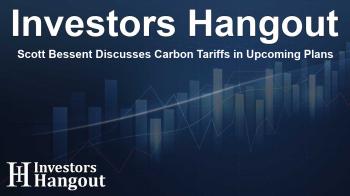Scott Bessent Discusses Carbon Tariffs in Upcoming Plans

Scott Bessent's Insights on Carbon Tariffs
In discussions about future economic strategies, Scott Bessent, a prominent figure in the financial realm, has voiced support for the consideration of carbon tariffs. Engaging with U.S. senators, Bessent emphasized the importance of integrating environmental considerations into trade policies.
The Potential for Carbon Tariffs
Bessent described the idea of carbon tariffs as an intriguing approach within broader tariff programs. His perspective suggests that these tariffs could play a vital role in shaping environmental accountability among companies.
Collaboration with Future Leaders
During his statements, Bessent made it clear that coordination with the upcoming administration is crucial. He expressed enthusiasm for working with President-elect Donald Trump's team to explore innovative strategies that might include carbon tariffs as a key component.
Broader Trade Practices to Consider
Beyond carbon emissions, Bessent indicated that tariffs could also target various trade practices deemed unfair or harmful to economic growth. This approach could help level the playing field for American businesses while promoting sustainable practices.
Looking Ahead to Strategic Trade Policies
As discussions continue, Bessent's emphasis on tariffs aimed at reducing carbon footprints reflects a growing trend among policymakers. The intersection of trade and environmental responsibility could lead to transformative changes in how international business operates.
Engaging in Future Dialogues
Bessent’s advocating for carbon tariffs is indicative of a shift towards sustainable economic policies. His role as a financial leader positions him uniquely to influence future discussions related to tariffs and international trade strategies.
Conclusion: Building a Sustainable Future
In summary, Scott Bessent's advocacy for carbon tariffs showcases a significant step in integrating environmental considerations into U.S. economic policies. As the nation prepares for new economic leadership, his insights could pave the way for progressive policies designed to foster environmental sustainability while supporting economic growth.
Frequently Asked Questions
What are carbon tariffs?
Carbon tariffs are taxes imposed on imports based on their carbon emissions, aimed at encouraging environmentally friendly practices.
Why are carbon tariffs being considered?
These tariffs are considered to enhance environmental accountability and address unfair trade practices that contribute to climate change.
How might carbon tariffs affect international trade?
They could potentially reshape trade dynamics by incentivizing countries to adopt greener technologies and practices to remain competitive.
What role does Scott Bessent play in this discussion?
Scott Bessent is a financial leader discussing potential strategies for implementing carbon tariffs as part of future trade policies.
What are other considerations alongside carbon tariffs?
Besides carbon tariffs, there are discussions around tariffs aimed at various unfair trade practices to protect American businesses.
About The Author
Contact Addison Perry privately here. Or send an email with ATTN: Addison Perry as the subject to contact@investorshangout.com.
About Investors Hangout
Investors Hangout is a leading online stock forum for financial discussion and learning, offering a wide range of free tools and resources. It draws in traders of all levels, who exchange market knowledge, investigate trading tactics, and keep an eye on industry developments in real time. Featuring financial articles, stock message boards, quotes, charts, company profiles, and live news updates. Through cooperative learning and a wealth of informational resources, it helps users from novices creating their first portfolios to experts honing their techniques. Join Investors Hangout today: https://investorshangout.com/
The content of this article is based on factual, publicly available information and does not represent legal, financial, or investment advice. Investors Hangout does not offer financial advice, and the author is not a licensed financial advisor. Consult a qualified advisor before making any financial or investment decisions based on this article. This article should not be considered advice to purchase, sell, or hold any securities or other investments. If any of the material provided here is inaccurate, please contact us for corrections.

